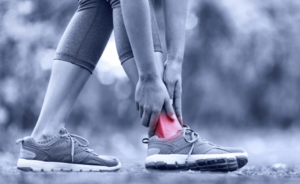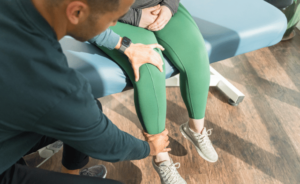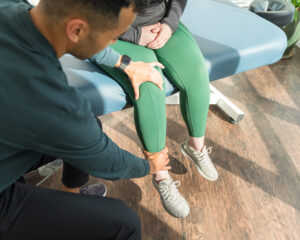Causes of Back Pain
Back pain is a complex condition with numerous potential origins, often making it challenging to pinpoint the exact cause without professional help. Common contributors include:
- Mechanical issues: Problems related to the way your spine moves or the way you feel when you move your spine in certain ways. This can include disc breakdown, spasms, tense muscles, and ruptured discs.
- Injuries: Sprains and fractures can result from falls, accidents, or sudden movements, often causing acute and severe back pain.
- Conditions and diseases: Various medical conditions such as scoliosis, arthritis, spinal stenosis, and spondylolisthesis can lead to chronic back pain.
- Lifestyle factors: Poor posture, lack of regular exercise, improper lifting techniques, and even psychological stress can significantly contribute to back discomfort.
Understanding the root cause of your back pain is a critical first step toward effective treatment and relief.
Common Symptoms and Warning Signs
Back pain manifests in various forms, with symptoms ranging widely in intensity and duration. Be mindful of the following:
- Persistent stiffness or aching anywhere along your spine.
- Sharp, localized pain in the neck, upper back, or lower back, especially after lifting heavy objects or engaging in other strenuous activity.
- Chronic ache in the middle or lower back, particularly after sitting or standing for extended periods.
- Pain radiates from the lower back to the buttock, down the back of the thigh, and into the calf and toes.
Immediate medical attention should be sought if back pain is accompanied by:
- Fever
- Unexplained weight loss
- Significant leg weakness
- Severe, continuous abdominal pain
- Changes in bladder or bowel control
Prevention Tips
Preventing back pain is achievable with simple, daily practices and lifestyle adjustments:
- Maintain a healthy diet and weight.
- Remain active—under the guidance of your healthcare provider.
- Avoid prolonged inactivity or bed rest.
- Warm up or stretch before exercising or other physical activities, such as gardening.
- Maintain proper posture.
- Wear comfortable, low-heeled shoes.
- Sleep on a mattress of medium firmness to minimize any curve in your spine.
- Lift with your knees, keep the object close to your body, and do not twist when lifting.
How Physiotherapy Can Help
Physiotherapy is invaluable in the management and treatment of back pain through:
- Manual therapy: Techniques such as joint manipulation and mobilization to decrease pain and improve function.
- Exercise programs: Tailored stretches and exercises that enhance core strength, flexibility, and stability.
- Posture education: Guidance on correct posture to alleviate stress on the back.
- Pain management techniques: Utilizing heat, ice, ultrasound, or TENS to reduce pain.
- Functional training: Education on safe, effective ways to perform daily activities, reducing the risk of injury.
By addressing the specific needs and conditions of each patient, physiotherapy can significantly alleviate back pain and improve one’s quality of life.
Success Stories: Real-life Testimonials
Nothing speaks more to the effectiveness of physiotherapy for back pain relief than the stories of those who have experienced significant improvements. Here are a few testimonials from our patients:
Emily’s Journey to Recovery
“After suffering from chronic lower back pain for years due to an old sports injury, I finally decided to seek professional help. The team at the clinic not only addressed my immediate pain but also taught me how to maintain a healthy back and avoid future injuries. Their personalized approach and supportive environment have been crucial in my recovery. I’m now back to enjoying my favorite activities without fear of pain.”
David’s Transformation
“I was skeptical about physiotherapy, thinking my severe back pain was something I just had to live with. But after a few sessions, I started noticing a significant difference. The exercises and manual therapy, coupled with the education I received about my condition, changed my life. I can’t thank the team enough for their patience and expertise.”
Anita’s Path to a Pain-Free Life
“Following a car accident, I was left with debilitating back pain that made even the simplest tasks unbearable. The physiotherapists at the clinic were compassionate and highly skilled. They worked closely with me to develop a treatment plan that was both manageable and effective. Thanks to their help, I’ve made a full recovery and have regained my mobility and independence.”
When to See a Physiotherapist
Consider seeking professional physiotherapy if:
- Your back pain persists beyond a few weeks.
- You experience severe pain that does not improve with rest.
- You have pain following an injury or a specific incident.
- You experience numbness, tingling, or weakness in your arms or legs.
- Your pain interferes with daily activities.
Conclusion
Back pain is a widespread issue that affects individuals of all ages and backgrounds. Understanding the causes and symptoms is vital, but taking proactive steps towards prevention and treatment is crucial. Physiotherapy offers a holistic approach to back pain, addressing the root causes and providing long-term solutions.
At our clinic in downtown Vancouver, we are dedicated to supporting your health and enabling you to lead a pain-free, active life. If back pain is affecting your daily life, don’t hesitate to contact us or seek professional help. Remember, the path to recovery starts with taking the first step toward seeking help and understanding your body.






